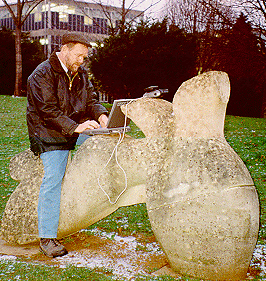Interface: George H Brett II, in Interview
George Brett set up CNIDR (pronounced 'Snyder' – the Clearinghouse for Networked Information Discovery and Retrieval) in 1992, with a three year grant obtained from the National Science Foundation. CNIDR exists to promote and support the implementation of networked information discovery and retrieval tools through working with applications developers and through its involvement in producing networking standards. With the grant due to run out in October of this year, Brett decided it was time for a switch. Now a consultant in Colorado, he is working with the Boulder Public Library and on the ACLIN (Access Colorado Library and Information Network) Project. I caught up with him at the University of Bath recently, where he was based while engaged in a research project for ISSC.
His has been a varied career (his Curriculum Vitae includes the jobs of postman and printer). He graduated from Florida State University with a degree in Constructive Design. From the PC in his UKOLN office, Brett showed me images of some of the artwork that he produced at this time, rather appropriately large spider's web-like constructions. The sculptures, both site specific and time-based, woven from twine, were stretched between different points and left to gather whatever the wind and weather would supply. Brett would then return and photograph the ever changing sculpture (the images are available from his home page).
A desire to teach led him to the completion of a Masters Degree in education, and a spell in teaching. How does he feel about librarians having a teaching role? "Should librarians be educators?". He pauses for a moment. "Yes indeed! There is no better way of learning than by teaching." But in the context of information Brett prefers to use the term 'coach' rather than teacher.
What differences has Brett observed in the library and information world of the UK as opposed to the US? Not many. Indeed, the number of libraries that are networked is relatively comparable. The main difference is that in the US the advertisement of services is at a much more advanced level. He explains "For as many US libraries as are networked, there are probably more which are not. It's just that the networked libraries are honking their horn loud."
So is the belief that the state of networking affairs is more advanced in the US something of a misconception? The short answer is yes, although, ironically, this is because US libraries have been in the game for longer. "They've been paying out for networking equipment and training people all along, and now they are reaching the point where they are less able to jump onto something new … so in a way you in the UK have the lead. It's a game of leap frog."

George Brett, Cyberjockey
Nevertheless, Brett has found the culture of network use in this country deeply frustrating.. He was invited over to investigate the possibilities of creating what he described, intriguingly, as 'an umbrella organisation for the provision of the meta level'. The meta level comprises particular network services which coordinate and integrate the vast range of other services now emerging. Reluctant to give too much information away as to the exact details of his research, he did say that he felt there is no one thing that needs to be done to achieve this level, but that his recommendations would mix physical technologies for access with tools and applications for the content. He admits that in the UK the content level is very high and it is here that the UK excels, especially in subject based resources.
At a higher policy level there is a lot of work to be done. But at the level of access to networks, he senses a fear of lack of control by computing centres. "The computing centres keep the doors closed on the Internet, and hope that you don't want to know what's behind there. Everybody seems to be worried about pornography on the Internet, but I've seen pictures in British book stores and magazine stores that you would not be permitted to display in America. It strikes me that you want to start with your corner supermarkets and not mess with the Internet."
He is critical of UK higher education's 'head in the sand' mentality. A lot of commercially available material provides the public at large with information on the Internet, yet access to it is constrained in unnecessary and arbitrary ways. He has been consistently frustrated in his attempts to use the breadth of networking technologies which support his work and lifestyle. 'Have laptop, will travel' is his approach, and he came to the UK expecting to have no difficulty in making telephone calls and multimedia file transfers with his folks and colleagues back home, via his PowerBook. Sadly, he has encountered problems at almost every step. The networking support in our universities is perhaps not yet ready for fully fledged Net citizens like Brett.
Moving on to the question of ownership of digital information, Brett is very concerned by what is happening in the US. He returns to his favourite subject. "I find it scary that companies can now buy the digital rights to reproduce works of art on the Internet." Commercialisation is rampant, and public access to information is being lost. Brett's great grandfather, a bookstore manager, took over the management of the Cleveland Public Library in Ohio, in the days when readers paid to borrow. When the library began to lose money he opened the stacks to the public and organised reading sessions for local children. Free access, so long taken for granted, is under threat once more."Librarians need to wake up and organise – particularly with the subject based resources. It is time to think about copyright, access issues and protecting the collections that have been built up." He is not hopeful. "It's already late. And getting later."
